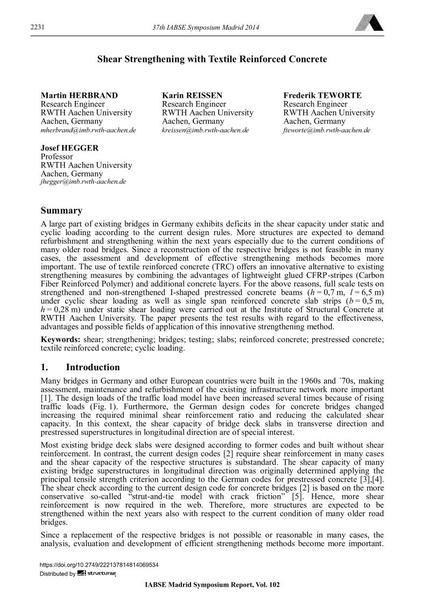Shear Strengthening with Textile Reinforced Concrete

|
|
|||||||||||
Détails bibliographiques
| Auteur(s): |
Martin Herbrand
Karin Reissen Frederik Teworte Josef Hegger |
||||
|---|---|---|---|---|---|
| Médium: | papier de conférence | ||||
| Langue(s): | anglais | ||||
| Conférence: | IABSE Symposium: Engineering for Progress, Nature and People, Madrid, Spain, 3-5 September 2014 | ||||
| Publié dans: | IABSE Symposium Madrid 2014 | ||||
|
|||||
| Page(s): | 2231-2238 | ||||
| Nombre total de pages (du PDF): | 8 | ||||
| Année: | 2014 | ||||
| DOI: | 10.2749/222137814814069534 | ||||
| Abstrait: |
A large part of existing bridges in Germany exhibits deficits in the shear capacity under static and cyclic loading according to the current design rules. More structures are expected to demand refurbishment and strengthening within the next years especially due to the current conditions of many older road bridges. Since a reconstruction of the respective bridges is not feasible in many cases, the assessment and development of effective strengthening methods becomes more important. The use of textile reinforced concrete (TRC) offers an innovative alternative to existing strengthening measures by combining the advantages of lightweight glued CFRP-stripes (Carbon Fiber Reinforced Polymer) and additional concrete layers. For the above reasons, full scale tests on strengthened and non-strengthened I-shaped prestressed concrete beams (h= 0,7 m,l= 6,5 m) under cyclic shear loading as well as single span reinforced concrete slab strips (b= 0,5 m,h= 0,28 m) under static shear loading were carried out at the Institute of Structural Concrete at RWTH Aachen University. The paper presents the test results with regard to the effectiveness, advantages and possible fields of application of this innovative strengthening method. |
||||
| Mots-clé: |
ponts renforcement
|
||||
